Radford University
Online Admissions
Apply to Radford Online Programs
We're proud to offer a diverse array of online programs that provide you with the flexibility and convenience you need to achieve your education and career goals, from anywhere in the world.

Experience Radford - Online

Affordable Online Education
Cost and Aid
At Radford University, we're committed to providing attainable, flexible education for every student. Meet with our financial aid team and learn about the value of a Radford education online, and how we can help.
Special Online Programs
-
Several of our degree completion, master's, and certificate programs are offered in a Fast Track format - asynchronous learning on your own time, with shorter course lengths and more start times per year.
-
Develop job-related skills through self-paced learning modules to earn certificates or credentials. We partner with employers to teach competency-based skills that build on prior work experience.
-
Earn professional development credits toward your career's ongoing education requirements in our online courses.
Online Offerings
-
Adapted Curriculum K-12 concentration
Program types offered: M.S.
Why study Adapted Curriculum K-12 concentration?
The Special Education: Adapted Curriculum K-12 concentration is for those who will work with students with complex disabilities who require an individualized, adapted curriculum and specialized supports to gain access to the general education curriculum and learn within K-12 general education settings.- College
-
- College of Education and Human Development
- Location
-
- Main Campus in Radford, VA and Online Courses
-
Autism Studies
Program types offered: Certificate
Why study Autism Studies?
The Certificate of Autism Studies is designed to prepare personnel to educate and support individuals with autism spectrum disorders (ASD), which includes autism, Asperger syndrome and other pervasive developmental disorders.- College
-
- College of Education and Human Development
- Location
-
- Online
-
Blindness and Visual Impairment, Pre-K-12 concentration
Program types offered: M.S.
Why study Blindness and Visual Impairment, Pre-K-12 concentration?
The Visual Impairment concentration is for teachers who already hold a license in special education and would like to become certified to teach students with visual impairments and blindness.- College
-
- College of Education and Human Development
- Location
-
- Main Campus in Radford, VA and Online Courses
-
Business Administration
Program types offered: MBA
Why study Business Administration?
The online Master of Business Administration degree program provides a broad-based, cross-functional education in core business areas such as operations management, marketing, accounting, finance and strategic management.- College
-
- Davis College of Business and Economics
- Location
-
- Online
-
Business Analytics
Program types offered: Certificate
Why study Business Analytics?
Be empowered to take on the challenges of emerging data-driven business environments with the applied knowledge and best practices you will gain in the SAS Graduate Certificate in Business Analytics online program at Radford University.- College
-
- Davis College of Business and Economics
- Location
-
- Online
-
Business Analytics concentration
Program types offered: MBA
Why study Business Analytics concentration?
The Radford University online Master of Business Administration with a concentration in Business Analytics prepares you to understand and apply big data analysis to navigate general and industry-specific business challenges.- College
-
- Davis College of Business and Economics
- Location
-
- Online
-
Classroom Management micro-credential
Program types offered:
Why study Classroom Management micro-credential?
This micro-credential introduces a three-tiered framework of classroom management that creates environments where successful learning experiences are highly probable for K-12 students. You will learn about the foundation of PBIS and the research that supports this approach to classroom management.- College
-
- College of Education and Human Development
- Location
-
- Online
-
Clinical Practice Leadership track
Program types offered: D.N.P.
Why study Clinical Practice Leadership track?
The Clinical Practice Leadership track in the D.N.P. program is a specialized track designed to equip experienced nurses with the skills, knowledge and leadership necessary to excel in complex healthcare environments.- College
-
- College of Nursing
- Location
-
- Online
-
Clinical Research
Program types offered: Certificate
Why study Clinical Research?
The purpose of the Graduate Certificate of Clinical Research is to prepare individuals in the area of clinical research. The curriculum will focus on product research, development, and regulations; compliance and safety; clinical trial operations; regulatory and trial management/adherence; and ethical and participant safety.- College
-
- Waldron College of Health and Human Services
- Location
-
- Online
-
Crime Analysis
Program types offered: Certificate
Why study Crime Analysis?
The work product of a crime analyst can be used to inform tactical and strategic decision making, support investigative efforts, assist in the study of resource needs, and facilitate the development of criminal justice policy.- College
-
- College of Humanities and Behavioral Sciences
- Location
-
- Online or Main Campus in Radford, VA
-
Cybersecurity
Program types offered: Certificate
Why study Cybersecurity?
This affordable online cybersecurity certificate program from Radford University’s Vinod Chachra IMPACT Lab empowers you to master critical IT security workplace objectives while progressing at your own pace.- College
-
- Artis College of Science and Technology
- Location
-
- Online
-
Data and Information Management
Program types offered: M.S.

Why study Data and Information Management?
The Radford University M.S. in Data and Information Management combines traditional classroom learning with practical experience, resulting in a curriculum that challenges students to solve real problems for real clients. Class discussions build a theoretical foundation reinforced with hands-on projects enabling students to engage with faculty and industry partners in our advanced and high-tech collaborative workspace.- College
-
- Artis College of Science and Technology
- Location
-
- Main Campus in Radford, VA
-
Deaf and Hard of Hearing, PreK-12 concentration
Program types offered: M.S.
Why study Deaf and Hard of Hearing, PreK-12 concentration?
The Deaf and Hard of Hearing, PreK-12 concentration in the Master of Science degree in Special Education with Virginia licensure prepares teachers to work with deaf and hard of hearing students of all ages.- College
-
- College of Education and Human Development
- Location
-
- Main Campus in Radford, VA and Online Courses
-
Design Thinking
Program types offered: Certificate
Why study Design Thinking?
The online Design Thinking Certificate requires students to complete 15-credit hours of graduate level coursework that empowers them to strategize, plan, and solve complex problems across a multitude of venues.- College
-
- College of Visual and Performing Arts
- Location
-
- Online
-
Design Thinking concentration
Program types offered: M.F.A.
Why study Design Thinking concentration?
The design thinking concentration is a 100% online, terminal degree that provides students with in-depth experiences using the design process to solve complex problems.- College
-
- College of Visual and Performing Arts
- Location
-
- Online
-
Early Childhood Special Education concentration
Program types offered: M.S.
Why study Early Childhood Special Education concentration?
The concentration in Early Childhood Special Education prepares graduates to work with and advocate for infants and young children with developmental delays and disabilities, birth to five, and their families in a variety of early intervention, home and school settings.- College
-
- College of Education and Human Development
- Location
-
- Main Campus in Radford, VA and Online Courses
-
Education
Program types offered: Ed.D.

Why study Education?
Our fully online, cohort-based doctoral program prepares educators to lead responsively and develop practices of collaborative inquiry, continuous improvement, and community partnership. Students are supported by dedicated, full-time faculty in implementing a dissertation in practice to investigate and address persistent problems of practice in their own educational systems.- College
-
- College of Education and Human Development
- Location
-
- Online
-
Education, Curriculum and Instruction no licensure concentration
Program types offered: M.S.
Why study Education, Curriculum and Instruction no licensure concentration?
This non-licensure concentration in the M.S. in Education program provides participants with knowledge, skills and dispositions in the areas of high impact teaching strategies, cultural responsiveness, instructional technology, and globalization of the curriculum and interdisciplinary teaching.- College
-
- College of Education and Human Development
- Location
-
- Online
-
Educational Leadership
Program types offered: M.S.

Why study Educational Leadership?
The Master of Science degree in Educational Leadership is designed to prepare professional personnel to fill positions as PK-12 school principals or instructional supervisors. Successful completion of this fully online program will lead to an endorsement in PK-12 school administration and supervision.- College
-
- College of Education and Human Development
- Location
-
- Online
-
Educational Leadership
Program types offered: Certificate
Why study Educational Leadership?
The Post-Professional Certificate in Educational Leadership is designed to provide specific background, education, and tools to licensed teachers to prepare them to address the needs of preK-12 students in a leadership or administrative capacity.- College
-
- College of Education and Human Development
- Location
-
- Online
-
Emergency Services
Program types offered: B.S.

Why study Emergency Services?
Realism is at the heart of our Emergency Services program. When emergencies happen, first responders are on the front lines providing care, managing crises, and rescuing those in need. With Carilion Clinic, students prepare to face these challenges in a variety of professions on the entry and management levels.- College
-
- Waldron College of Health and Human Services
- Location
-
- Radford University at Carilion in Roanoke, VA
-
General Business concentration
Program types offered: B.B.A.
Why study General Business concentration?
Complete your degree on your schedule online with the General Business concentration in the Bachelor of Business Administration (B.B.A.) in Management program. Earn the credentials you need to jump start your career.- College
-
- Davis College of Business and Economics
- Location
-
- Online
-
General Curriculum K-12 concentration
Program types offered: M.S.
Why study General Curriculum K-12 concentration?
At Radford University, our traditional graduate program in special education: general curriculum leads to a master’s degree and eligibility for a license to teach special education in kindergarten through grade 12.- College
-
- College of Education and Human Development
- Location
-
- Main Campus in Radford, VA and Online Courses
-
Geospatial Intelligence
Program types offered: Certificate
Why study Geospatial Intelligence?
IMPACT's GEOINT curriculum is aligned with top industry certifications and provides extensive hands-on experience in geographic information systems (GIS), remote sensing, spatial analysis and GEOINT analysis.- College
-
- Artis College of Science and Technology
- Location
-
- Online
-
Health Sciences
Program types offered: M.S.
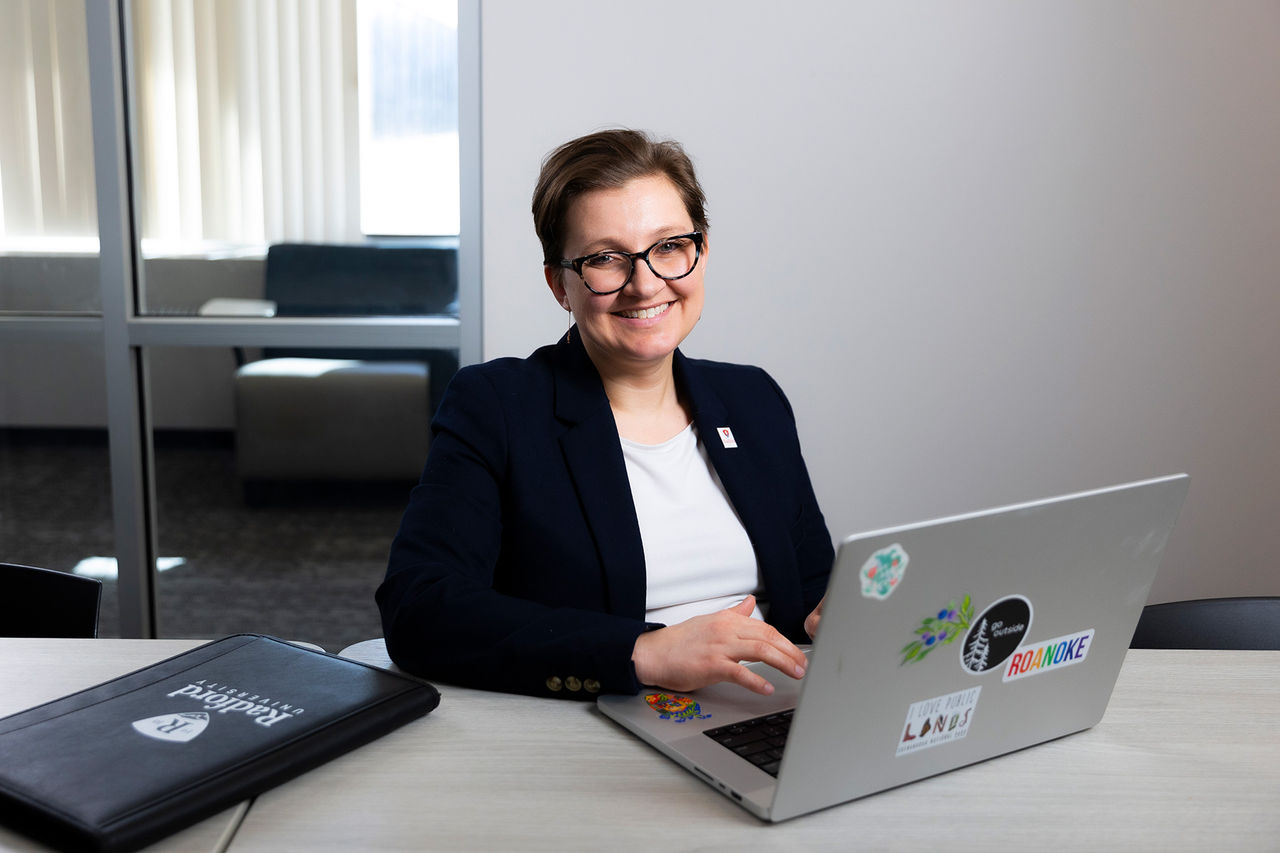
Why study Health Sciences?
The Master of Science program in Health Sciences provides an advanced, broad-based graduate field of study which positions students who have completed a Bachelor’s degree to elevate and accelerate their careers in a health-related field. Offered in a flexible format and convenient environment, the M.S. in Health Sciences is well-suited to working professional as all courses are offered 100% online. The program is 36-credits, may be completed in 4 years and includes coursework in healthcare administration, healthcare leadership, population health and research. Students also have the option of selecting the Clinical Research Administration (CRA) concentration and/or enrolling in the Dual Degree Track (M.S. to D.H.Sc.)- College
-
- Waldron College of Health and Human Services
- Location
-
- Online
-
Health Sciences
Program types offered: D.H.Sc.

Why study Health Sciences?
The Doctorate in Health Sciences equips seasoned health professionals with the necessary knowledge, skills and abilities to take their careers to the next level. Offered in a flexible format and convenient environment and designed for health professionals from a wide range of backgrounds, the D.H.Sc. program empowers health professionals with the leadership skills needed to become change agents within the fields of healthcare, community and public health, and higher education. Graduating students may pursue opportunities as health service directors/managers, health educators, public health officers, healthcare delivery administrators, researchers, and/or university faculty.- College
-
- Waldron College of Health and Human Services
- Location
-
- Online
-
Healthcare Administration
Program types offered: M.H.A.

Why study Healthcare Administration?
If your goal is a senior-level position or higher in the field of health management, a master’s degree is a must. Our program will provide foundational business-oriented skills that will help you lead a complex healthcare organization and prepare you for an exciting career in a growing, dynamic, fast-changing field.- College
-
- Waldron College of Health and Human Services
- Location
-
- Online
-
Healthcare Organizational Management Minor
Program types offered: Minor
Why study Healthcare Organizational Management Minor?
Healthcare leaders manage healthcare operations and teams to support excellent patient care and organizational outcomes. The minor in Healthcare Organizational Management consists of 15 semester hours which includes 3 required courses and options for 2 elective courses. All courses are delivered in an online format.- College
-
- Waldron College of Health and Human Services
- Location
-
- Online
-
Innovation Concentration
Program types offered: MBA
Why study Innovation Concentration?
Learn to promote exciting initiatives, drive transformation and create value in dynamic environments to become a top candidate for leadership roles that require innovative thinking.- College
-
- Davis College of Business and Economics
- Location
-
- Online
-
K-12 Provisional to Professional Pathway
Program types offered:

Why study K-12 Provisional to Professional Pathway?
The K-12 Provisional to Professional Pathway puts you in the driver’s seat of your professional learning. You will learn from current principals and teachers through online webinars, Q&A sessions and events designed to connect you with peers and professionals in the field.- College
-
- College of Education and Human Development
- Location
-
- Online
-
Literacy Education
Program types offered: M.S.

Why study Literacy Education?
The Literacy Education program equips educators to serve as literacy leaders in the K-12 setting and offers educators an opportunity to earn endorsement credentials to become Reading Specialists in Virginia. We pride ourselves in providing our graduates with all the skills they need to help all students develop essential literacy skills through culturally responsive curriculum and instruction. We offer two pathways to become and endorsed Reading Specialist in Virginia – M.S. in Literacy Education, 30 hours, six semesters or Reading Specialist Certificate for teachers who already have an education-related master’s degree, 24 hours, five semesters.- College
-
- College of Education and Human Development
- Location
-
- Online
-
Math Micro-Credentials
Program types offered:
Why study Math Micro-Credentials?
The micro-credentials are designed to empower you to help all of your students access your instruction, including math!- College
-
- College of Education and Human Development
- Location
-
- Online
-
Mathematics
Program types offered: Certificate
Why study Mathematics?
Transform your career with just six online courses by earning the Graduate Certificate in Mathematics. You’ll be ready to teach dual enrollment math in high school or undergraduate college mathematics courses.- College
-
- College of Education and Human Development
- Location
-
- Online
-
Mathematics Education concentration
Program types offered: M.S.
Why study Mathematics Education concentration?
The math education content area studies concentration is a 36-hour fully online program designed for: licensed secondary mathematics teachers, students with an undergraduate degree in a mathematics education licensure program and prospective college/university mathematics instructors.- College
-
- College of Education and Human Development
- Location
-
- Online
-
Nurse Leadership track
Program types offered: D.N.P.
Why study Nurse Leadership track?
The curriculum for the Nurse Leadership track in the D.N.P. program combines advanced nursing knowledge with leadership and management principles, healthcare policy and advocacy, quality improvement strategies and innovative healthcare delivery models.- College
-
- College of Nursing
- Location
-
- Online
-
Nursing
Program types offered: BSN
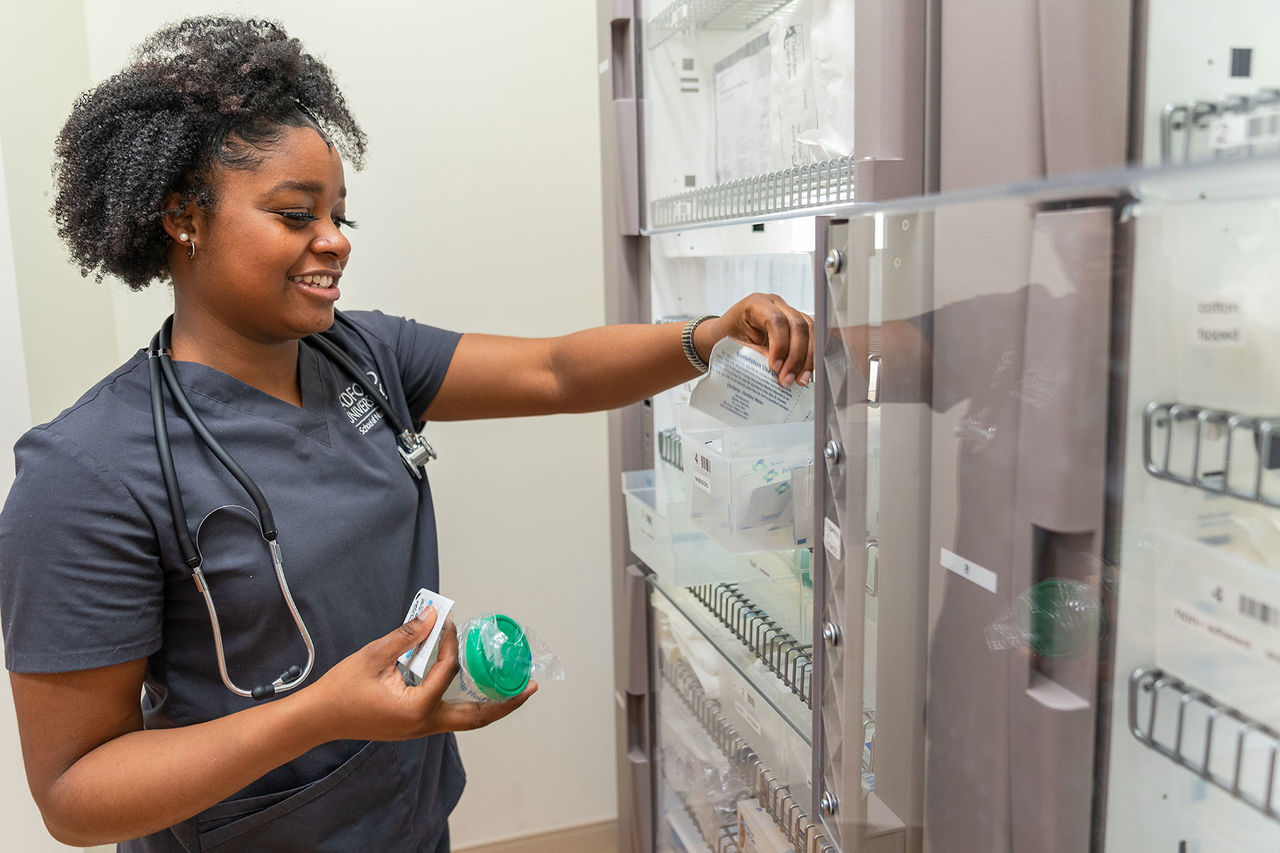
Why study Nursing?
For more than 50 years, Radford University’s outstanding reputation across Virginia for graduating exceptional students makes it one of the premier institutions for earning a Bachelor of Science in Nursing. Employers frequently request our graduates because they are ready to practice in caring for patients in today’s healthcare environment.- College
-
- College of Nursing
- Location
-
- Main Campus in Radford, VA and Radford University in Roanoke, VA
-
Nursing Administration
Program types offered: MSN
Why study Nursing Administration?
This online master’s degree in nursing administration builds on your undergraduate foundation and expands your expertise to critical management areas such as informatics, financial management and legal issues in healthcare.- College
-
- College of Nursing
- Location
-
- Online
-
Nursing Practice
Program types offered: D.N.P.

Why study Nursing Practice?
Radford University’s School of Nursing‘s online Doctor of Nursing Practice (D.N.P.) program prepares registered nurses who currently hold a bachelor’s degree in nursing science, a master’s degree, or a master’s degree in nursing science for advanced nursing practice. The program is accredited by the CCNE and SACSCOC.- College
-
- College of Nursing
- Location
-
- Main Campus in Radford, VA
-
Occupational Therapy
Program types offered: O.T.D.
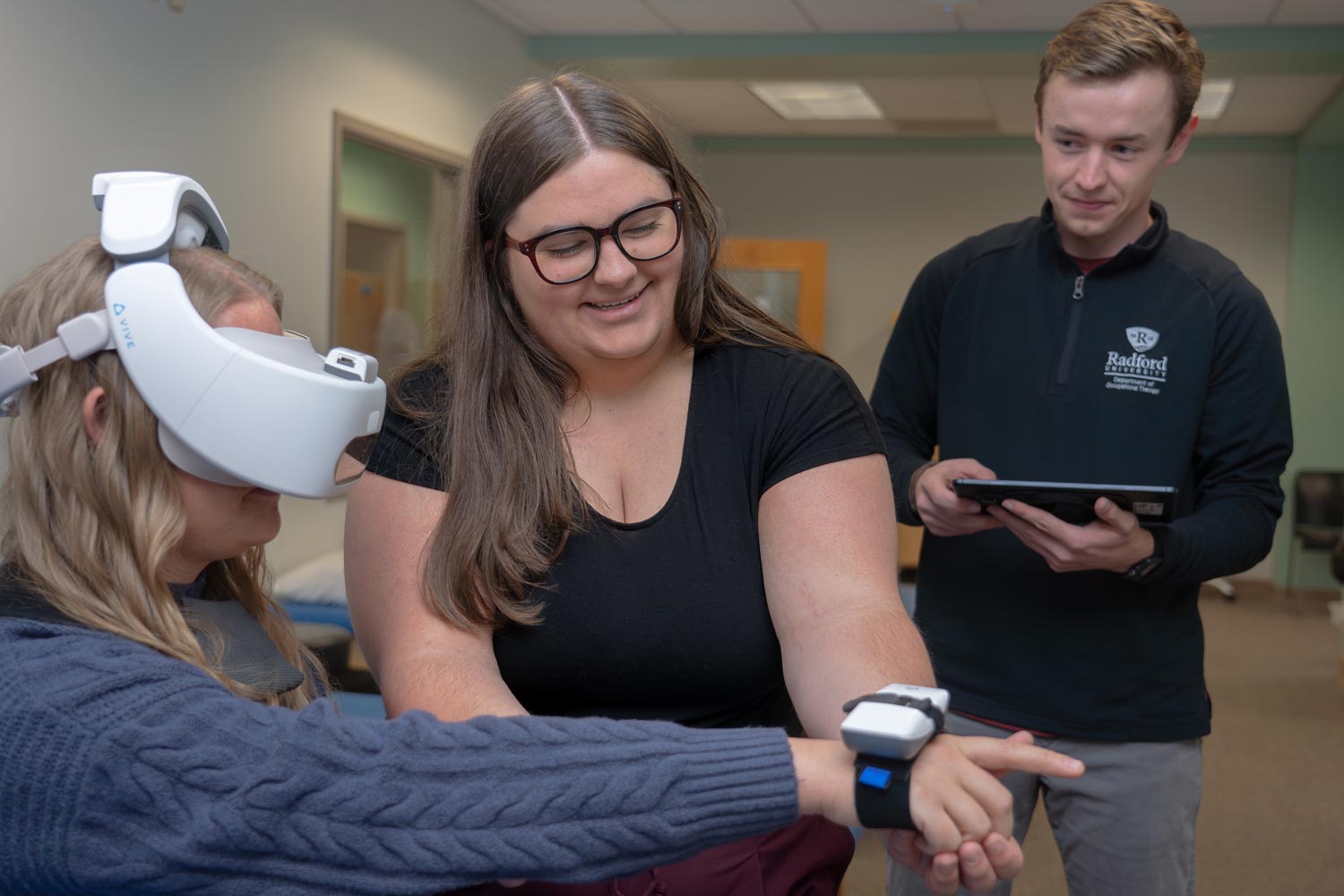
Why study Occupational Therapy?
The Doctor of Occupational Therapy (OTD) program at Radford University Carilion is a post-professional terminal degree designed for currently practicing occupational therapists with interests in becoming educators, clinical leaders, program developers, or clinical researchers. Some of the program is offered online, which allows the student flexibility in meeting both their professional and academic goals.- College
-
- Waldron College of Health and Human Services
- Location
-
- Online
-
Professional Writing
Program types offered: Certificate
Why study Professional Writing?
The Professional Writing Graduate Certificate is an online program that can be completed in one calendar year when the courses are taken consecutively. It's designed to help working professionals and graduate students strengthen their professional, technical, business, and digital writing skills and stay competitive in the workforce.- College
-
- College of Humanities and Behavioral Sciences
- Location
-
- Online
-
Psychiatric Mental Health Nurse Practitioner
Program types offered: Certificate
Why study Psychiatric Mental Health Nurse Practitioner?
The Psychiatric Mental Health Nurse Practitioner graduate certificate will prepare the advanced practice nurse with the expertise and skills to diagnose and treat individuals suffering with psychiatric and mental health disorders.- College
-
- College of Nursing
- Location
-
- Online
-
Psychiatric Mental Health Nurse Practitioner track
Program types offered: D.N.P.
Why study Psychiatric Mental Health Nurse Practitioner track?
The Psychiatric Mental Health Nurse Practitioner track of the D.N.P. program prepares graduates with the knowledge and skills to synthesize and apply theories, clinical reasoning and research in the treatment of individuals, families and groups across the lifespan.- College
-
- College of Nursing
- Location
-
- Online
-
Public Health Minor
Program types offered: Minor
Why study Public Health Minor?
Public health promotes and protects the health of people and the communities where they live, learn, work and play. The minor in public health consists of 15 semester hours which include 4 required courses and a choice of 1 elective course. All courses are delivered in a synchronous, on-line format.- College
-
- Waldron College of Health and Human Services
- Location
-
- Online
-
Reading Specialist
Program types offered: Certificate
Why study Reading Specialist?
The Reading Specialist post-professional certificate provides a route to reading specialist endorsement for practicing educators who already hold a graduate degree in the field of education.- College
-
- College of Education and Human Development
- Location
-
- Online
-
Respiratory Therapy degree advancement track
Program types offered: B.S.
Why study Respiratory Therapy degree advancement track?
The Respiratory Therapy degree advancement track is specifically designed to meet the needs of practicing respiratory therapists who have already completed or are anticipating completing an accredited respiratory care program with an entry into respiratory care professional practice degree.- College
-
- Waldron College of Health and Human Services
- Location
-
- Online
-
RN to BSN
Program types offered: BSN
Why study RN to BSN?
Gain prestigious credentials when you earn your RN to BSN online from Radford University. Coursework gives you both theory and real-world strategies to help improve patient outcomes.- College
-
- College of Nursing
- Location
-
- Online
-
Social Work
Program types offered: M.S.W.

Why study Social Work?
The Master of Social Work program focuses on clinical social work practice, allowing you to acquire a blend of direct practice skills coupled with an understanding and appreciation of human diversity. Our students develop relationship, advocacy, and practice skills to serve individuals locally, nationally, or globally.- College
-
- Waldron College of Health and Human Services
- Location
-
- Main Campus in Radford, VA
-
Special Education
Program types offered: M.S.

Why study Special Education?
Through application-based projects and practitioner-friendly assignments, you will learn to be an inclusive special educator who provides engaging and differentiated instruction to learners with diverse learning abilities. Upon completing the program, you will have enhanced knowledge and skills as a special educator ready to make a difference in the classroom for all students.- College
-
- College of Education and Human Development
- Location
-
- Main Campus in Radford, VA and Online Courses
-
Special Education, Adapted Curriculum K-12
Program types offered: Certificate
Why study Special Education, Adapted Curriculum K-12?
The graduate certificate in Special Education, Adapted Curriculum is designed to provide specific background, education and tools to students to address the needs of K-12 special education learners with significant disabilities including intellectual disabilities, autism and multiple disabilities.- College
-
- College of Education and Human Development
- Location
-
- Online
-
Special Education, Deaf and Hard of Hearing
Program types offered: Certificate
Why study Special Education, Deaf and Hard of Hearing?
The graduate certificate in Special Education, Deaf and Hard of Hearing, is designed to provide specific background, education and tools to students to address the education needs of preK-12 learners who are deaf and hard of hearing.- College
-
- College of Education and Human Development
- Location
-
- Online
-
Special Education, Early Childhood
Program types offered: Certificate
Why study Special Education, Early Childhood?
The graduate certificate in Special Education, Early Childhood, is designed to provide specific background, education and tools to students to address the needs of infants, toddlers and preschoolers with disabilities.- College
-
- College of Education and Human Development
- Location
-
- Online
-
Special Education, General Curriculum
Program types offered: Certificate
Why study Special Education, General Curriculum?
The graduate certificate in Special Education, General Curriculum is designed to provide specific background, education and tools to students to address the needs of learners with disabilities in general education classrooms, including learning disabilities, intellectual disabilities, emotional and behavioral disabilities and autism.- College
-
- College of Education and Human Development
- Location
-
- Online
-
Special Education, General Curriculum Post-Professional
Program types offered: Certificate
Why study Special Education, General Curriculum Post-Professional?
The post-professional certificate in Special Education, General Curriculum is designed to provide specific background, education and tools to K-12 teachers to prepare them to address the needs of students with disabilities in the general curriculum classroom.- College
-
- College of Education and Human Development
- Location
-
- Online
-
Special Education, Visual Impairment
Program types offered: Certificate
Why study Special Education, Visual Impairment?
The graduate certificate in Special Education, Visual Impairment is designed to provide specific background, education and tools to students to address the needs of preK-12 learners with blindness and visual impairments.- College
-
- College of Education and Human Development
- Location
-
- Online
Hybrid Offerings
-
Crime Analysis
Program types offered: Certificate
Why study Crime Analysis?
The work product of a crime analyst can be used to inform tactical and strategic decision making, support investigative efforts, assist in the study of resource needs, and facilitate the development of criminal justice policy.- College
-
- College of Humanities and Behavioral Sciences
- Location
-
- Online or Main Campus in Radford, VA
-
Family Nurse Practitioner
Program types offered: MSN
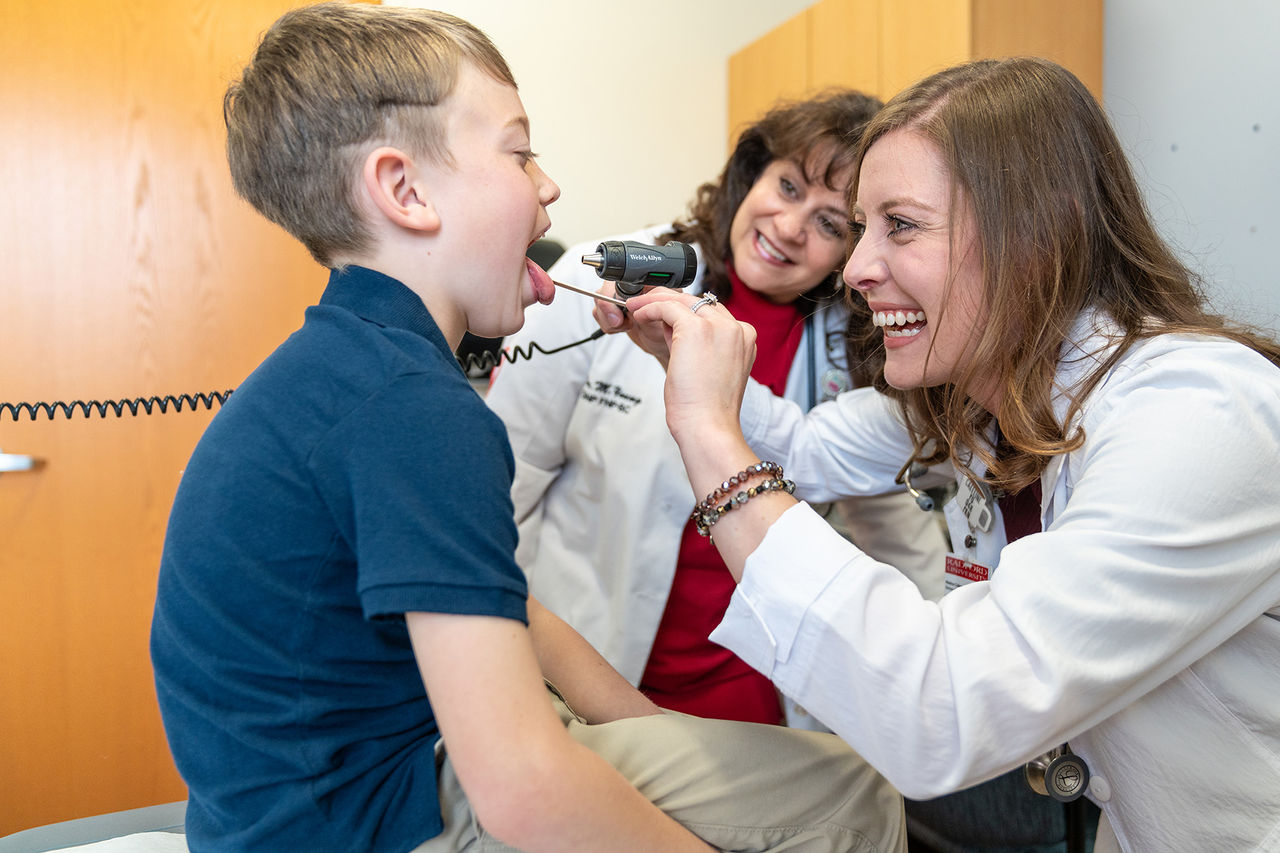
Why study Family Nurse Practitioner?
The Family Nurse Practitioner program prepares registered nurses with graduate-level academic knowledge and clinical skills to practice in the roles of clinicians, educators, and leaders. Family nurse practitioners diagnose and treat acute and chronic conditions, partnering with patients to maintain health and wellness, with a focus on preventative care.- College
-
- College of Nursing
- Location
-
- Radford University in Roanoke, VA
-
Family Nurse Practitioner track
Program types offered: D.N.P.
Why study Family Nurse Practitioner track?
The Family Nurse Practitioner track of the D.N.P. program prepares graduates with the knowledge and skills to synthesize and apply theories, clinical reasoning, and research in the treatment of individuals, families and groups across the lifespan.- College
-
- College of Nursing
- Location
-
- Main Campus in Radford, VA
-
Health Sciences
Program types offered: B.S.
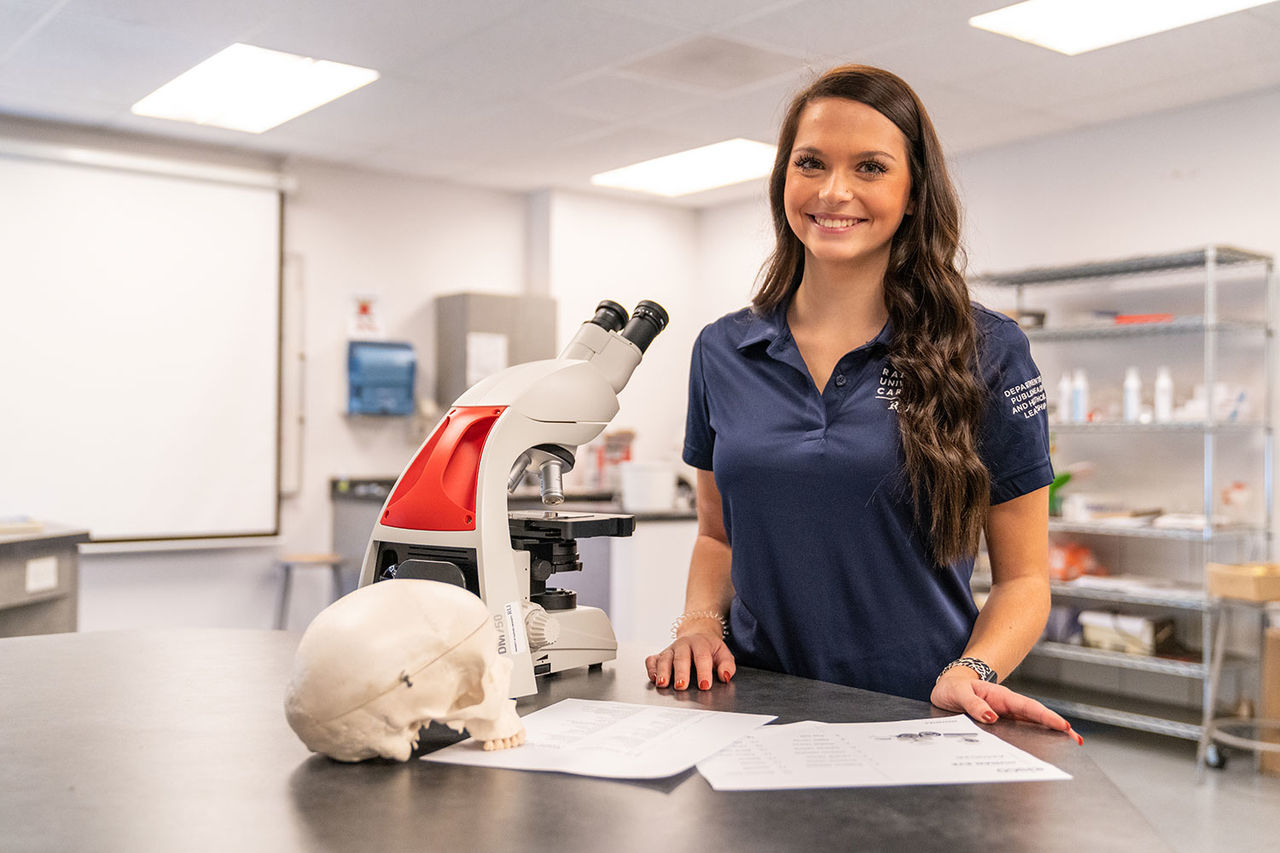
Why study Health Sciences?
Health Sciences is a broad-based foundational degree. The program can help you enter a non-clinical health profession or prepare you for a graduate program in a health-related field. If you are already working in the health sector, completing this program can help with career advancement.- College
-
- Waldron College of Health and Human Services
- Location
-
- Radford University Carilion in Roanoke, VA
-
Healthcare Administration
Program types offered: B.S.

Why study Healthcare Administration?
The mission of the Bachelor of Science in Healthcare Administration program is to provide a broad base of knowledge and skills to prepare you with general analytical, communication, and management competencies to serve as a professional in the field of healthcare administration. This program will prepare you to work within the fundamental business aspects of healthcare.- College
-
- Waldron College of Health and Human Services
- Location
-
- Radford University Carilion in Roanoke, VA
-
Interdisciplinary Studies
Program types offered: B.A., B.S.

Why study Interdisciplinary Studies?
The Interdisciplinary Studies in Liberal Arts major (IDSL) offers students the opportunity to build an individualized multidisciplinary course of study, enabling students to integrate two concentrations and pursue their educational vision. In collaboration with the IDSL program advisor, prospective students will create an individualized study plan and identify courses to meet their desired goals.- College
-
- College of Humanities and Behavioral Sciences
- Location
-
- Main Campus in Radford, VA and online
-
Nursing Practice
Program types offered: D.N.P.

Why study Nursing Practice?
Radford University’s School of Nursing‘s online Doctor of Nursing Practice (D.N.P.) program prepares registered nurses who currently hold a bachelor’s degree in nursing science, a master’s degree, or a master’s degree in nursing science for advanced nursing practice. The program is accredited by the CCNE and SACSCOC.- College
-
- College of Nursing
- Location
-
- Main Campus in Radford, VA
-
OTA to MOT Hybrid Bridge Track
Program types offered: M.O.T.
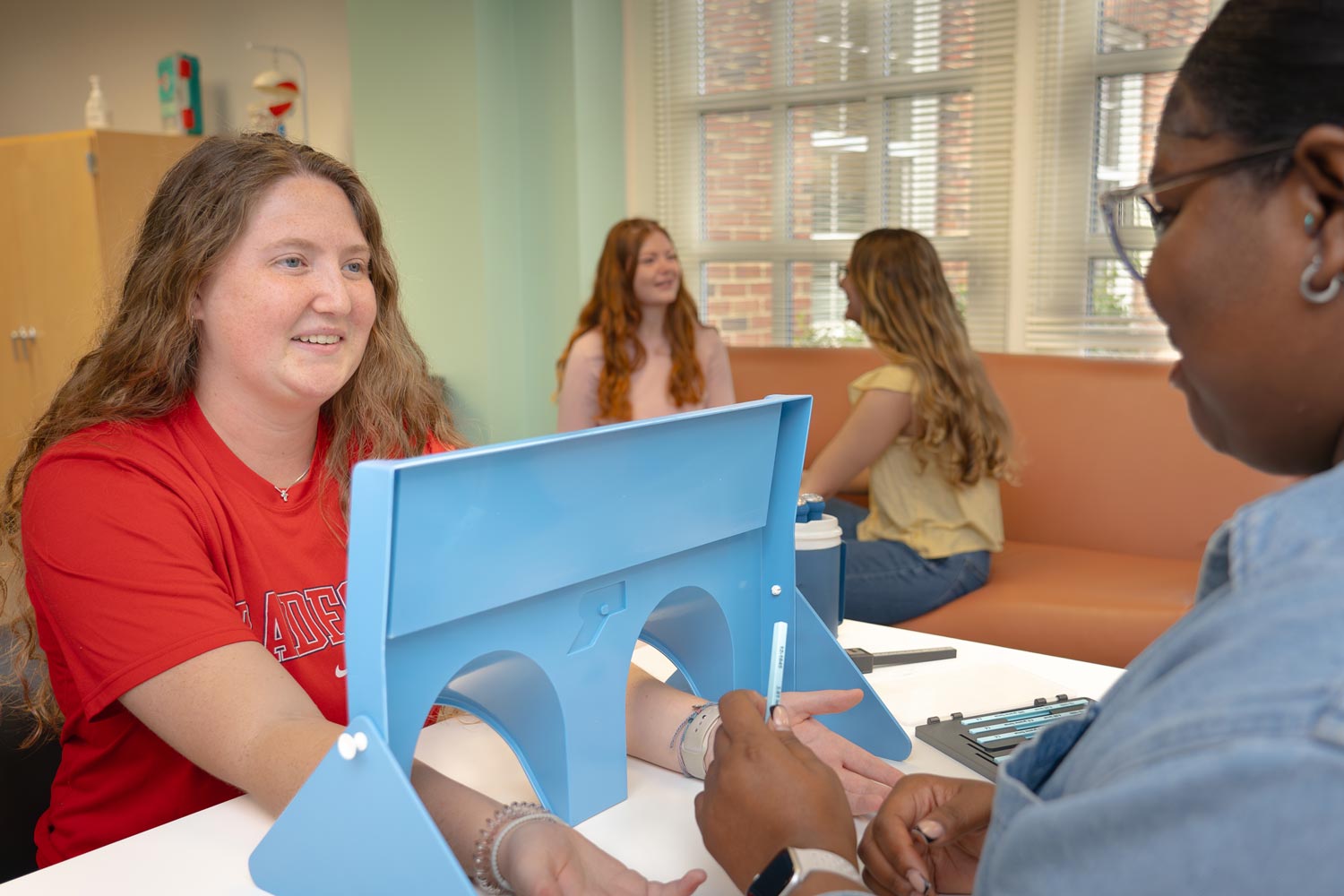
Why study OTA to MOT Hybrid Bridge Track?
Occupational therapists work in diverse settings with people of all ages, helping them gain or regain the abilities to do the daily activities they need and want to do. Students earn the Master of Occupational Therapy degree, gaining eligibility to sit for the national board examination to become a credentialed occupational therapist.- College
-
- Waldron College of Health and Human Services
- Location
-
- Radford University at Carilion in Roanoke, VA
-
Public Health
Program types offered: B.S.

Why study Public Health?
The Bachelor of Science in Public Health is an interdisciplinary degree that prepares you to improve community health and wellness through education, advocacy, and service. You will learn to promote healthy lifestyles and tackle community health needs such as chronic disease, substance use addiction, aging populations, mental illness, outbreaks, and disaster preparedness.- College
-
- Waldron College of Health and Human Services
- Location
-
- Radford University Carilion in Roanoke, VA
Federal Requirements
Transparency on disclosures and authorizations
Radford University offers a number of programs leading to professional licensure. Each of our online programs meet the requirements for licensure in Virginia.


